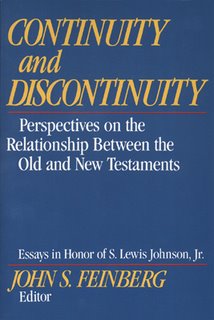Continuity and Discontinuity: Hermeneutics Part 2
 Another distinction that we find in the hermeneutics of dispensational and covenantal theology has to do with continuity and discontinuity. When it comes to the dispensations, dispensationalists tend to hold to a discontinuity between each age. This means there tends to be a break between the old dispensation and the new. It is discontinuous. This tends to come from the fact that many dispensationalist tend to see dispensations as tests for which man must pass or fail. In dispensational theology every dispensation, at least up to this point, ends in failure of the test (many hold to the fact that man will fail in every dispensation even the millennial reign when Satan is released). This leads to God ending the old test to start a new dispensation.
Another distinction that we find in the hermeneutics of dispensational and covenantal theology has to do with continuity and discontinuity. When it comes to the dispensations, dispensationalists tend to hold to a discontinuity between each age. This means there tends to be a break between the old dispensation and the new. It is discontinuous. This tends to come from the fact that many dispensationalist tend to see dispensations as tests for which man must pass or fail. In dispensational theology every dispensation, at least up to this point, ends in failure of the test (many hold to the fact that man will fail in every dispensation even the millennial reign when Satan is released). This leads to God ending the old test to start a new dispensation.Covenantal theologians tend to hold more of continuity between the dispensations. In other words, when a new dispensation begins they see it more as a continuous development of the old dispensation. There is now a new dispensation but it retains much of the old. This stems from the fact that to the covenantal theologian a dispensation is a new period where God is revealing more of his covenant of Grace, seeing this as a progressive revelation of the same covenant leads to looking for more similarities between the dispensations, rather than looking for dissimilarities.
This affects the hermeneutic of both views. The dispensationalist when interpreting scripture tends to see a complete break between dispensations and nothing from the old dispensation will continue into the new unless it is specifically stated in the new dispensation. For the covenantal, it is the other way around. Everything from the old dispensation will continue in the new dispensation unless it is specifically said to be discontinued in this new dispensation.
This means that we will have to also do some hermeneutics to discover which hermeneutic is correct. Both views have claimed to have done this, but for many of us we simply lean on the hermeneutic we have been taught without checking our foundation.
God Bless,
Doug



5 Comments:
Doug,
If Dispensationalists do not like continuity, they have many passages to "spin" such as
Matthew 5:17-18 and Luke 24:25-27 to name a couple.
Jazzycat
Doug, I guess I am somewhat ignorant about dispensationalism, even though I have considered myself dispensationalist. I have never thought that those period were failures or that they ceased. It seems to me that they proceeded into the next.
I have not really studied the dispensations. I guess I need to get into that a little more.
Thanks for the eye opener.
Hi Doug,
This point is actually what causes me to question where I am on the dispensational-covenant spectrum. I have just read the book you have used as a picture, and the thing that stands out most for me is that there is no dichotomy of views on continuity.
The continuity people recognize certain discontinuiuties and the discontinuity people have to recognize continuities.
I myself would not be dispensational especially on the place of Israel - for me the church has replcaed Israel, but I am not sure there is continuity here either - there are so many differences between Israel and the church.
Have you read the book? What did you think?
Simon
Jazzy,
Thanks, those verses are helpful.
Doug
T.A.
I'm sure there are progressive dispy's who do not see them as failures, but this is where I have the most trouble understanding the progressive dispys because they tend to have different views depending on who you talk with (not that covanantal theologians are flawless).
Gordon Cloud seems to be a great example of a progressive dispy who has a good understanding of the view though. He has been valuable in helping me to see some distinctions between the views.
Like you I tend to have a lot of dispensationalism in me from being raised southern baptist, but I've never really done a deep study on the issues either.
Doug
Simon,
I've not had a chance to read through that book yet but I plan to once I finish a few others I need to finish first. I'm sure this view paints a good middle ground picture because it is in honor of S. Lewis Johnson, and that tended to be where he fell.
As far as the continuity and discontinuity issue goes, you are right that both see aspects that continue and some that discontinue, but there is still a big distinction between the two groups. One tends to reject more from previous dispensations and one tends to accept more. This is because of their hemenuetic.
Thanks for your comment. I look forward to more of your thoughts.
Doug
Edward,
Thanks for presenting a consistent Covenantal view, and raising the issues that are at the heart of the debate it is helpful to me.
God bless,
Doug
Doug,
Great stuff!
Post a Comment
<< Home